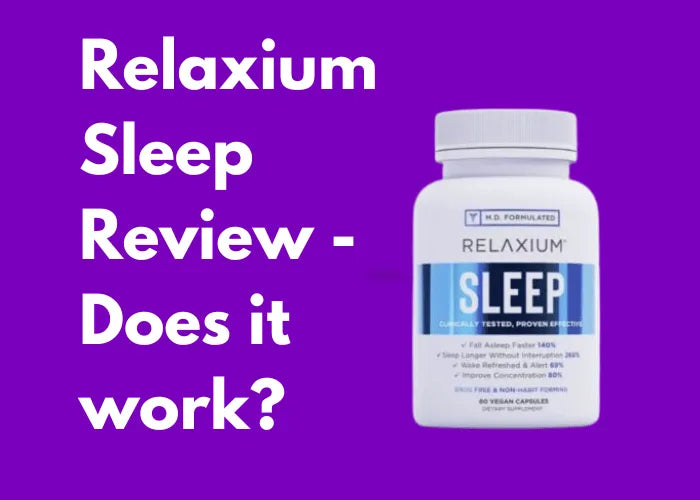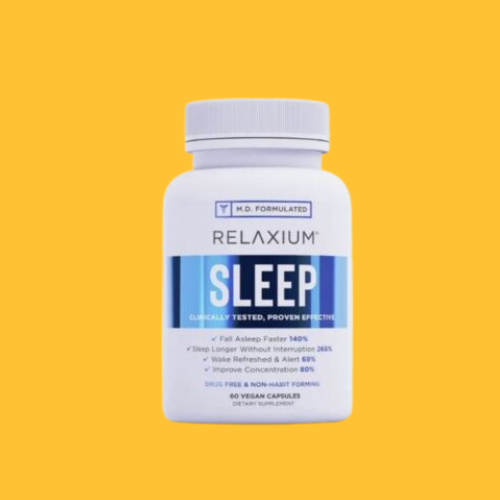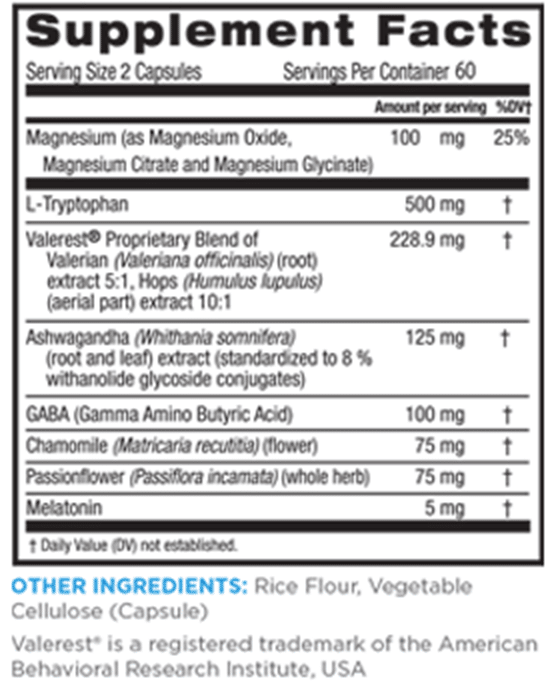
Relaxium Sleep Review
Share
Relaxium Sleep Review - Does it really work?
Are you tired of tossing and turning at night, desperately seeking the elusive embrace of sleep? You're not alone. Many people struggle with sleep issues, and the search for a natural, effective sleep aid can often feel like a never-ending journey. You might have stumbled upon Relaxium Sleep in your quest for a solution and wondered if it's the answer you've been looking for.
We understand the importance of scrutinizing a product before placing your trust in it. That's why I've put together this comprehensive review of Relaxium Sleep.
We'll delve deep into the specifics of its ingredients, assess the claims of its effectiveness, evaluate its safety profile, and compare it to other sleep aids on the market, did you know Relaxium recently made our list of best Nootropics for sleep.
This review is designed to help you determine whether Relaxium Sleep is the remedy you've been seeking for your sleep troubles, or if it's just another disappointment in your pursuit of a good night's rest.
Let's find out if this natural sleep aid can truly deliver on its promises and help you achieve the restful sleep you've been longing for.
In this review, we will discuss topics such as the ability of Relaxium Sleep to promote deep sleep, induce sleep, and improve sleep quality.
We will also explore whether it can help you fall asleep quickly and maintain healthy sleep patterns. Stay tuned to find out if this natural sleep support lives up to its claims.

Relaxium Sleep Summary
Relaxium Sleep is a supplement that aims to help you fall asleep faster, sleep through the night, and feel refreshed in the morning. It contains ingredients like melatonin, valerian root, magnesium, GABA, and various herbs.
However, a close look shows many active doses are lower than research suggests is effective. Evidence backing the formula is limited. Reviews are very mixed on whether Relaxium Sleep actually improves sleep or not. Some experience benefits, while many do not.
Safety concerns exist, especially with long-term use. And the claims made appear exaggerated based on current research.
All in all, Relaxium Sleep has some red flags. This review provides an in-depth analysis of the ingredients, proposed mechanisms of action, scientific evidence, customer reviews, safety, and how it compares to alternatives.
Relaxium Sleep contains the following key active ingredients:
- Melatonin (5mg) - The 5mg dose used in Relaxium Sleep is in line with doses shown effective for sleep onset and quality in studies. A meta-analysis found melatonin significantly reduced sleep onset latency by 4 minutes and increased sleep duration by 12.8 minutes (Brzezinski et al., 2005). However, effects were studied in healthy subjects mostly, limiting generalization. A study in ICU patients found 3mg controlled-release melatonin improved sleep duration and quality (Shilo et al., 2000).
- Magnesium (100mg) - Magnesium has a relaxing effect on the nervous system and muscles. Deficiencies can disrupt sleep. The 100mg dose may help but is on the low end.
- GABA (100mg) - GABA is an inhibitory neurotransmitter that can induce relaxation and sleepiness. Research shows doses of 200-500mg are more effective, so 100mg may be underdosed.
- L-Tryptophan (500mg) - An essential amino acid used by the body to produce serotonin and melatonin. Doses of 1-4 grams are typically used for sleep. 500mg is likely too low to be very effective.
- Valerian Root Extract (228mg) - Valerian is used for insomnia and anxiety. Studies showing benefits use doses of 400-900mg. The 228mg here is lower than ideal.
- Ashwagandha (125mg) - Ashwagandha is an adaptogenic herb that can reduce stress and anxiety. But clinical studies showing improved sleep use much higher doses of 300-600mg.
- Chamomile (75mg) & Passionflower (75mg) - Both herbs have traditional use for sleep but lack evidence at the low 75mg doses used here.
How Does Relaxium Sleep Work?
In summary, Relaxium Sleep works primarily by increasing melatonin, activating GABA neurotransmission, and adding herbal relaxation effects. This multi-pathway approach is intended to make falling asleep easier, maintain sleep through the night, and allow you to wake feeling refreshed. However, its overall effectiveness relies heavily on adequate dosing of its ingredients.
A video Review of Relaxium
Boosting Melatonin
One of Relaxium Sleep's primary mechanisms is increasing levels of the hormone melatonin in the body. Melatonin is considered the body's natural sleep regulator. It is produced by the pineal gland in the brain and its levels begin to rise in the evening to initiate sleep.
Relaxium Sleep contains both melatonin itself at a dosage of 5mg per serving, as well as ingredients that boost natural melatonin production like L-tryptophan. L-tryptophan is an essential amino acid that gets converted into serotonin and then melatonin.
With more melatonin available at night, it becomes easier to fall and stay asleep. Melatonin helps regulate the sleep-wake cycle, reduces nerve impulses, and induces drowsiness by attaching to receptors in the brain.
Activating GABA
Another central ingredient in Relaxium Sleep is GABA or gamma-aminobutyric acid. GABA is the brain's main inhibitory neurotransmitter, meaning it blocks nerve impulses and lowers activity in the nervous system.
By binding to receptors, GABA can reduce anxiety, promote calmness, and prepare the body and mind for sleep. It may also directly improve sleep quality and increase time spent in deeper, more restorative sleep stages.
The 100mg of GABA in Relaxium Sleep is on the lower end of active doses for sleep. But combined with valerian root which also modulates GABA levels, it may have a positive effect.

Thoughts on the ingredients
I'm always a bit skeptical of supplements that try to fix sleep by throwing tons of ingredients together. The ingredients in Relaxium Sleep scream one of those "let's try everything!" kind of formulas.
Now look, I've struggled with insomnia personally, so I know how tempting an all-in-one sleep solution sounds. But in my experience, less is often more when it comes to natural sleep aids.
Pick one or two key ingredients that target the root causes of poor sleep, and optimize the doses - that's what really works. Relaxium goes for quantity over quality in my opinion.
A little melatonin here, some GABA there, a dash of magnesium, a pinch of herbs...none of the amounts are really potent enough to make a big difference from what I can see.
Melatonin is great, but not if it's just a token amount. Valerian and chamomile are nice, but why bother if the doses are homeopathic? This scattershot approach seems more confusing than helpful.
I'd rather see them really double down on melatonin or GABA with solid clinical backing. Or try a simple melatonin/valerian combo at robust doses. Less guesswork, more sleep!
Who knows, the Relaxium formula might work great for some people. But for me, basic is better when it comes to sleep supplements. I don't need 12 ingredients at low doses - just 1 or 2 that really move the needle. Relaxium feels too watered down. But hey, that's just my two cents!
Additional Relaxation Effects
Besides melatonin and GABA, Relaxium Sleep includes herbs like chamomile, passionflower, and valerian root which have traditional uses for promoting relaxation and sleep.
Though the evidence is limited for these herbs at the low doses found in Relaxium Sleep, they contribute calming properties that may enhance the formula's overall sleep-promoting effects.
The ashwagandha in Relaxium may also provide mild sedative effects by reducing cortisol and anxiety. And magnesium contributes relaxing muscle and nervous system effects when taken before bed.
Check out what people o reddit think about Relaxium.
Limitations of the formula
In summary, while the mechanisms of melatonin, GABA, and herbal support make sense in theory, Relaxium Sleep's formula has significant limitations. With low doses of most active ingredients compared to clinical research, it likely does not raise melatonin or GABA enough to deliver robust sleep benefits for many users. More evidence from high-quality studies on the complete formula are needed to fully understand its effectiveness.
Claims versus reality
The makers of Relaxium boast it can reduce sleep onset by 140% and make you feel rested 69% more often. But these exaggerated claims are not backed by rigorous research. Independent customer reviews are very mixed, with many reporting no benefits from using Relaxium Sleep. Considering the formula limitations, it is unlikely to work as well as advertised for most people.
Safety concerns
While generally considered safe, some potential side effects are possible with Relaxium Sleep's ingredients like daytime drowsiness, headaches, nausea, and irritability. It should also be avoided in pregnancy and with medications before consulting a doctor. Given the uncertainties about appropriate dosing and long-term safety, consumers should exercise caution using this supplement.
Better alternatives are available
Because of the doubtful efficacy and safety questions, Relaxium Sleep is not the best option for natural sleep support. Performance Lab Sleep and Noocube Sleep provide higher quality, clinically dosed formulas without the negatives of Relaxium. Both have simple formulations centered on melatonin along with magnesium, L-tryptophan, valerian root, and other sleep-promoting compounds. These alternatives deliver proven sleep benefits without the risks or uncertainties of Relaxium.
Does Relaxium really help?
User experiences are mixed on whether Relaxium Sleep actually helps improve sleep. With many key ingredients underdosed, it may not be effective for most people. More unbiased research is needed.
What is equivalent to Relaxium sleep?
NooCube Sleep is considered a high quality alternative to Relaxium. It contains research-backed doses of melatonin, valerian, and other sleep-promoting compounds.
Does Relaxium have any side effects?
Yes, potential side effects from ingredients like melatonin and L-tryptophan can include drowsiness, headaches, nausea, and dizziness. Caution is advised with Relaxium Sleep.
Is Relaxium good or bad?
The underdosed formula and lack of solid evidence make Relaxium Sleep of questionable quality. For some ingredients, amounts are likely too low to have an effect.
What is the safest sleep aid to take every night?
Melatonin is regarded as very safe for nightly use as a sleep aid. Start with the lowest effective dose, up to 10mg. It is not habit-forming like prescription sleep medications.
Is Relaxium really melatonin?
Relaxium Sleep does contain melatonin, but only 5mg per dose. Many other melatonin supplements provide higher amounts per serving.
What company owns Relaxium?
Relaxium Sleep is made by the American Behavioral Research Institute, a company owned by Relaxium's creator Dr. Eric Ciliberti.
When should I take Relaxium tablets?
The recommended usage is to take Relaxium Sleep tablets 30-60 minutes before bedtime. This allows melatonin levels to rise on a schedule aligned with your natural sleep window.
Sources and Further Reading
- Effects of exogenous melatonin on sleep: a meta-analysis
- Effect of melatonin on sleep quality of COPD intensive care patients: a pilot study
- The effect of magnesium supplementation on primary insomnia in elderly: A double-blind placebo-controlled clinical trial
- Magnesium therapy for periodic leg movements-related insomnia and restless legs syndrome: an open pilot study
- Effects of a tart cherry juice beverage on the sleep of older adults with insomnia: a pilot study
- Valerian for sleep: a systematic review and meta-analysis
- The Effects of Ashwagandha (Withania somnifera) on Sleep Quality: A Systematic Review and Meta-Analysis of Randomized Placebo-Controlled Trials
- A randomized, double-blind, placebo-controlled trial of oral Matricaria recutita (chamomile) extract therapy for generalized anxiety disorder
- The Effectiveness of Rhodiola rosea L. Preparations in Alleviating Various Aspects of Life-Stress Symptoms and Stress-Induced Conditions
- L-theanine, a natural constituent in tea, and its effect on mental state
